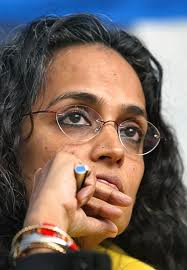
Arundhati Roy Tweets:
I do not believe that Delhi is the rape capital. If the rape has been going on for years. Muslims were raped in Gujarat & Kashmir, Manipur also happens but then picks up no sound.
Dalit women are raped in Kherlanjhi and his daughter was burned them Then a voice was raised.
Only a feudal mindset which raises voice of the people of the great nation, dominated happens with people in Delhi.
Chhattisgarh tribal woman with Sony Tyre happened if you will recall. But the police did not have even a raised voice. If the police officer received an award for courage.
Poor security forces in Kashmir when Kashmiri forces against rape does not demand a hanging. Rape of a higher-caste Dalit man does not, then no such demand.
This time there were hundreds of people gathered in Delhi when the girl was thrown out of the bus, people were standing naked, Someone gave him his cloak Everyone stood.
Rich in Delhi - was the first to distinguish between poor. But now they are still the target. Rape is not the issue. When the country was partitioned, we can not even imagine how many were raped, Inside we have a feudal mindset.
Rape is a terrible crime, but what people do. The girl is raped does not accept him. How do we live in society. In many cases, the rape of the same family are out of the house, There is too much violence in society.
But should not be protesting against choose. Every woman should resist rape. These dual mindset that you will sound but Manipur to Delhi rape of women, and for women of Kashmir Kherlanjhi not raise voice for the downtrodden.
Do not resist rape on the ground that he is in Delhi or any other place in Manipur.





Comments
Add new comment